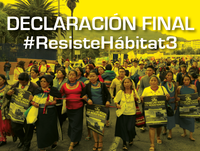Declaration for the Defence of our Territories
Rampant speculation, the basis for the new global economy, finds its engine of growth in cities. Urbanisation processes are presented as unavoidable and official agendas are based on this perception, in order to disguise how cities have turned into a commodity, an object of desire for the accumulation of capital. This has led us to ever more segregated and inequitable cities, reproducing the systematic violence of a patriarchal, racist and xenophobic system. In this model, access to services has become more of a privilege than a right.
At the same time, the rural area is forgotten and with it half of the world’s population, denying those living there the possibility of planning and managing their territories through direct control of the financial and real estate market. The borders between urban and rural worlds are becoming more blurred, and growing land conflict, between those who use their power to appropriate territories and do business and those who resist this expropriation and fight to preserve their rights, is becoming apparent. The steady growth created by the dominant urbanisation model not only generates immense inequalities in the city, but also appropriates the lands of other communities and peoples through its civilising project. Its main victims are the indigenous peoples, the farmers, shepherds and further populations affected by mega-projects, major roads and extractive activities, amongst many others.
Population displacement and migration crises are becoming increasingly serious. They are exacerbated by climate change and the resource wars that are promoted by States and transnational corporations, advocates of the existing development model. This model entails climate phenomena that affect the whole planet, with severe consequences for nature, living beings and the population in general, especially the most vulnerable. We, the voices of resistance, defend an interrelationship between different territories which is not based on cultural homogenisation, subordination, exclusion and dependence. To this end, it is necessary to change the production-consumption model, revitalise local markets and local economic cycles and strengthen food sovereignty.
The current urbanisation model is the expression of a capitalist system, a form of exclusionary and predatory development which only benefits 1% of the world’s population. In the face of this, it is necessary to coordinate the fight for the defence of territories via an integrated approach on habitat, fighting against the neoliberal wave, against evictions and dispossessions, defending human rights, the right to land, to water, to housing, to the city, and to the no-city, as well as to the social function of property and the social production of habitat. United under Resistance Habitat 3, we defend territories for the enjoyment of all, to allow all to participate in true democratic processes of decision making, from the neighbourhood level, to the national and international level.
While the UN-Habitat document entitled “New Urban Agenda” was elaborated in a military bunker behind the peoples’ backs, we, the peoples, communities and inhabitants, coming from 35 countries of the world, call for the right to decide with complete independence and diversity of gender, ethnicity, culture and provenance, with shared care and sovereignty of our bodies. We, the invisible, the 99 percent of those inhabiting this planet, raise our voices against exclusion, evictions and the criminalisation of protest, demanding recognition of and respect for multiple forms of living. From the middle of the world we are making progress in the construction of an Integrated Habitat Agenda by and for inhabitants, strengthening the International Tribunal on Evictions and other popular activities and fostering the coming
Quito, 20th October 2016

